When we hear the word maitake - most of us think of a nice, healthy addition to our grocery store shopping cart. Yup, maitake mushrooms are most commonly known for their delicious taste that makes them the perfect addition to soups, stews, and stir-frys. Yet, while this delicious, highly textured mushroom has been consumed for over 3,000 years as a table delicacy, it is also well known for its potential healing powers when the right extraction methods are in place.
Let’s close the kitchen for a bit and instead learn more about the medicinal uses of maitake mushrooms today. Here goes.
What is maitake mushroom?
Maitake mushrooms (Grifola frondosa) were nicknamed the “dancing mushroom” by the Japanese. This wild mushroom is usually found growing in clusters at the base of oak trees in various parts of Asia, but can sometimes be found on elms or maple trees.
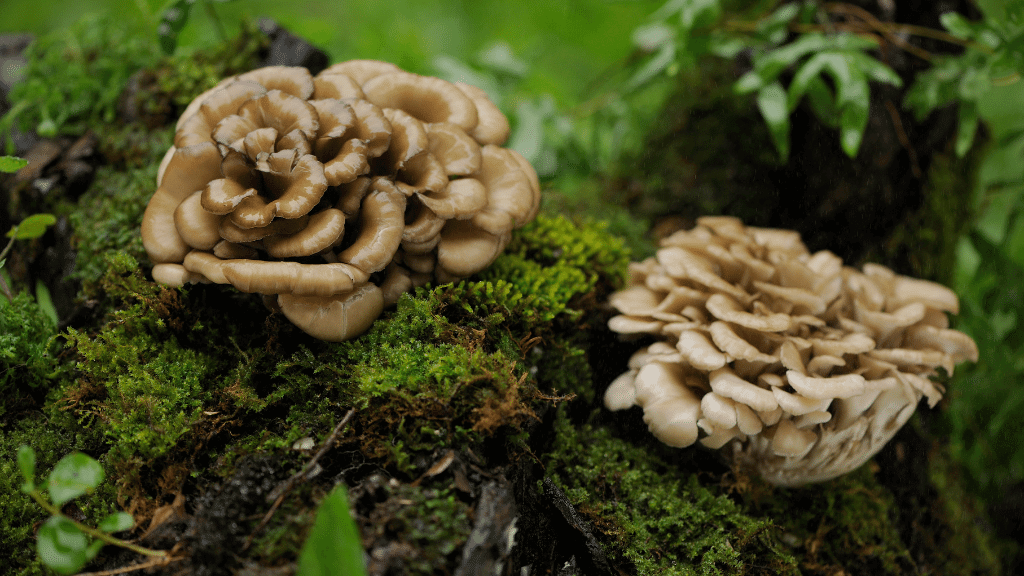
The Japanese have used maitake for centuries for both its medicinal and functional benefits to the human body, but maitake mushrooms are also considered a gourmet variety of mushroom. In recent decades, maitake mushrooms have gained popularity as a medicinal mushroom supplement and are a widely cultivated mushroom today that is used by many commercial supplement companies.
So, why are people so stoked about maitake? Let’s take a look.
What are the health benefits of maitake?Maitake is a type of adaptogen - meaning it helps the body fight off diseases and help to create both mental and physical homeostasis. Maitake contains high levels of antioxidants, vitamin D, vitamin B, copper, potassium, fiber, minerals, and amino acids. With over 26% of its makeup being beta-glucans, maitake is a potentially great treatment aid for:
- Various cancers
- Liver protection
- Cholesterol regulation
- Enhanced immune function
- Lowered blood glucose levels
In particular, many people consider maitake mushroom to be a superior medicinal mushroom because it’s so rich in minerals and bioactive polysaccharides like d-fraction (we’ll talk a little more about maitake d-fraction in a bit - hang tight).
While studies are still ongoing about maitake health benefits, there are tangible results that link maitake consumption and better outcomes for breast cancer, tumor growth, diabetes, high cholesterol, heart health, polycystic ovary syndrome, and weight loss. Now, let’s do a deeper dive into a few studies for the health needs noted above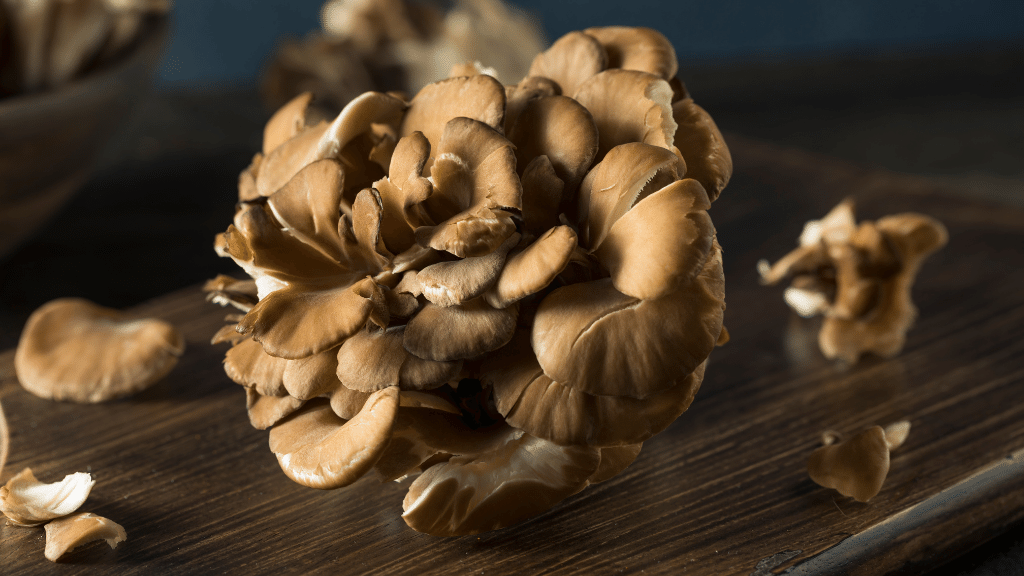
1. Breast cancer treatment
Various studies on maitake beta-glucan content have shown that this mushroom is a viable supplemental treatment option for breast cancer patients.
- Human study: This study noted that d-fraction found in maitake may help in treating breast cancer by stopping the growth of cancer cells. Over the treatment period, scientists saw modification of cell genetic makeup and positive outcomes for breast cancer patients.
- Human study: 36 postmenopausal breast cancer patients took maitake extract supplements to boost the immune system. While two patients withdrew due to side effects, other patients taking maitake saw a statistically significant association between the supplement and boosted immunologic function.
2. Stop tumor growth
Maitake supplementation for inhibition of tumor growth arguably has the biggest scientific body of evidence to back up claims. There are a mix of human and mice studies done to-date, showing the efficacy of this supplement for stopping tumor growth over time by boosting natural killer cells and increasing the body’s immune response.
- Human study: This study looked at whether human peripheral blood mononuclear cells treated with maitake d-fraction and interleukin-2 (IL2) develop increased cytolytic capacity against human tumor cells. Results showed that maitake d-fraction has the capacity to increase the lytic activity - in fact, it was shown that it’s more effective than taking with IL2 alone.
- Human study: Maitake extract supplementation was shown to induce apoptosis of TMK-1 cells, resulting in potential antitumor effects for gastric cancer.
- In-vitro study: Maitake d-fraction was inserted before tumor implantation significantly inhibited lung metastasis of colon-26 carcinoma and B16/BL6 melanoma cells. The study yielded positive results, suggesting that maitake d-fraction inhibits tumor growth by activating natural killer (NK) cells.
- Mice study: In this study, tumor growth in mice was inhibited by d-fraction supplementation that activated CD4(+) T cells and CD8(+) T cells.
- Mice study: In previous studies by these scientists, maitake d-fraction was shown to boost the natural immune response and inhibit tumor growth. This was put to the test in this mice study where d-fraction was taken alongside traditional chemotherapy. Positive results were shown at the end of the study, noting that maitake is a good choice for supplementation alongside administered chemotherapy.
3. Diabetes
While all of the below studies have been conducted on mice, positive results are shown across many studies that link maitake consumption with better diabetes outcomes for both type 1 and type 2. Further studies on humans are recommended before this is taken at face value.
- Mice study: This study demonstrated how maitake’s bioactive compounds aid in improving glycemic response for diabetic mice. The study looked at rats with and without type 2 diabetes - positive results were seen in both, but most notably, there was improved hyperglycemia and diabetes-induced alterations in rats with type 2 diabetes.
- Mice study: Three groups of type 1 diabetes induced rats were given gliclazide 10mg, pioglitazone 10-30mg , or maitake SX 2.5g daily, respectively. Bodyweight and insulin sensitivity were measured over the treatment period, and results showed that maitake SX could be a potentially useful treatment for insulin resistance and elevated blood pressure in type 1 diabetes patients.
- Mice study: This study looked at the effects of maitake alpha-glucan supplementation on diabetic mice. Scientists observed changes in body weight, levels of fasting plasma glucose, glycosylated serum protein (GSP), hepatic glycogen, serum insulin, triglycerides, cholesterol, free fatty acid, liver superoxide dismutase (SOD), glutathione peroxidase (GSHpx), reduced glutathione (GSH) and malondialdehyde (MDA). Results showed anti-diabetic effects with increases to insulin sensitivity.
- Mice study: Mice were given 140mg of maitake d-fraction to measure glucose levels over a 24 hour period, for days on end. Results showed that maitake supplementation positively influences glucose and insulin metabolism in insulin-resistant mice.
4. Weight loss
Tagging off of diabetes/maitake research, there is some evidence that maitake mushrooms may help reduce weight and improve blood sugar in rats, but this has not been shown for humans yet.
- Mice study: Obese mice that had been given a high-fat diet were eventually given maitake mushrooms to measure anti-obesity over time. Results showed maitake to be a novel functional food that may prevent life-style related diseases like obesity and diabetes.
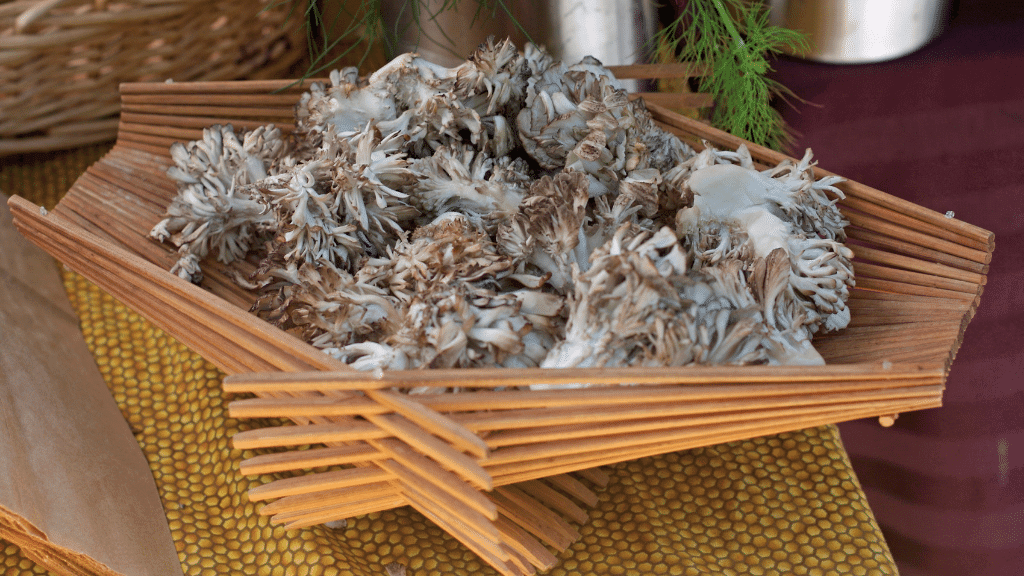
5. Cholesterol and heart health
Beta-glucans found in maitake may help with cholesterol regulation and heart health as a whole by improving artery function and reducing cardiovascular risk.
- Mice study: Mice were fed a diet that contained 10% maitake mushroom powder over a four week period. During this time, scientists observed plasma cholesterol-lowering effects of maitake.
- Mice study: Scientists explored maitake effects on serum cholesterol and hepatic low-density lipoprotein (LDL) receptor mRNA in mice over a four-week feeding period with 50g per day. Results showed that, when taken consistently, maitake has the potential to lower serum cholesterol levels.
6. Polycystic ovary syndrome
While studies are few and far between, maitake extract supplementation was shown to improve ovulation for polycystic ovary syndrome (human) patients.
- Human study: In Japan, 80 patients who had had mixed results with first-line clomiphene citrate (CC) treatment for polycystic ovary syndrome were randomly assigned to be given maitake extract or CC monotherapy. Some patients who had failed results with CC alone were given both during this period. Ovulation was assessed over this period of time, and results suggest that maitake extract alone may induce ovulation in patients and may be useful as an adjunct therapy for patients who failed first-line CC treatment.
What is maitake d-Fraction?
Maitake mushroom fruiting bodies contain water soluble protein bound polysaccharides or proteoglucans called d-fraction - this is the most important compound in maitake mushrooms that make it a viable medicinal mushroom.
Today we know a lot about d-fraction because it has been highly studied for its potential immune boosting and antitumor abilities for decades. Because of maitake being widely studied, d-fraction is generally regarded as the most potent fraction for enhancing the immune system and demonstrating cancer inhibition by activating the cellular immune system when maitake is taken orally.
Maitake d-fraction is typically taken in powder format, but can also be further extracted using hot water to increase the bioactivity of the mushroom’s compound.
Learn more about maitake d-fraction in our blog post that gets into the nitty gritty of this bioactive compound.
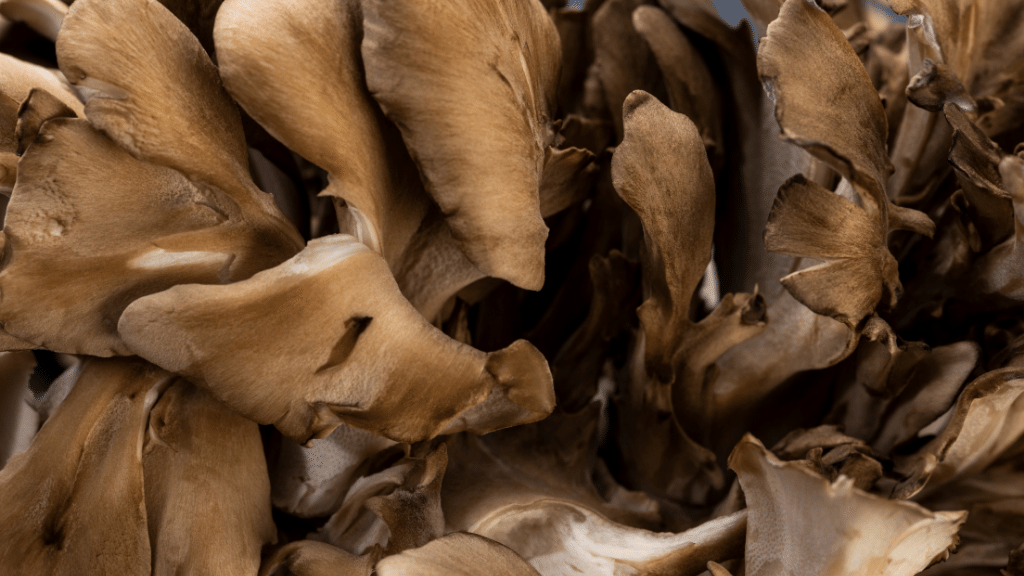
Important note on maitake studies
As you can see above, most studies completed on maitake mushroom supplements have been done on mice or in-vitro, with a few human studies littered into the mix. We want to reiterate that more research is needed in order to support the benefits of maitake supplementation for any and all of the ailments noted above.
Always consult your doctor before you start taking supplements. If your doctor gives you the “OK”, you might want to consider a few things when looking for a supplement that’s best for you…
Where can I buy maitake mushrooms?
Maitake mushrooms are becoming increasingly popular as a variety in chain supermarkets. Try your local chain's produce section and see if its available there. If not, you may have luck at a speciality or international produce store. Your local farmer's market is another great place to find exciting varieties of gourmet and medicinal mushrooms.
If all else fails check in with your state's local mushroom grower. You can find one using our interactive map here.
What to look for in a medicinal maitake product
If you’ve decided that maitake is the supplement for you, there are a number of ways to consume this nutrient-filled mushroom. Check out our very own list of the top medicinal mushroom supplement brands.
The most important things to consider when looking for a supplement are:
- Certificate of analysis: Always look for products with a published Certificate of Analysis (CoA) - the company should provide this, no problem
- User reviews: Read user reviews - sounds simple, but this can help a lot from others who have already started on their maitake mushroom exploration journey
- Extraction processes: Look at the extraction processes for the product - with the primary health benefits lying in maitake’s beta-glucans and maitake d-fraction, how the product is extracted is extremely important. We recommend hot water extraction as the key method
- Third party lab testing: Look for third party lab testing for d-fraction content to confirm legitimacy
- Vitamin-C: Taking maitake with vitamin-C may make the supplement more effective. While you may not find this in the product itself, consider this as a good addition to your maitake supplement
- Whole fruiting bodies only: Whole fruiting body supplements are considered best for overall health and better outcomes because that’s where the bulk of the beta-glucans and d-fraction live
Once you’ve done your research, you can then dive into the various types of supplements:
- Tincture: Maitake tincture comes in a small bottle with a dropper. These nearly tasteless droplets can be added into drinks, onto food, or simply taken by mouth.
- Extract powder: As with many other mushroom supplements, extract powder mixed into tea, coffee, or your favorite beverage is a popular way to consume maitake mushroom supplements. Additionally, people may steep the extract powder as a tea as an additional hot water extraction method to make the nutrients more bioactive and easier to break down.
- Capsules: People who prefer not to take powdered mushroom supplements utilize capsules to consume nutrient-rich maitake. If you decide to take capsules, ensure you’re looking for maitake D-fraction - which is an extract of the mushroom - in your capsule product description.
- Raw mushroom powder: Unlike many other mushroom types, there are studies where people took raw maitake powder as part of cancer trials. If you’d like to take raw mushroom powder, you can consume it similar to extract powder - either adding some to your favorite beverage or steeping it as a tea itself.
There is no wrong way to take a maitake supplement - it’s just important to find the best supplement format that has trusted extraction processes.
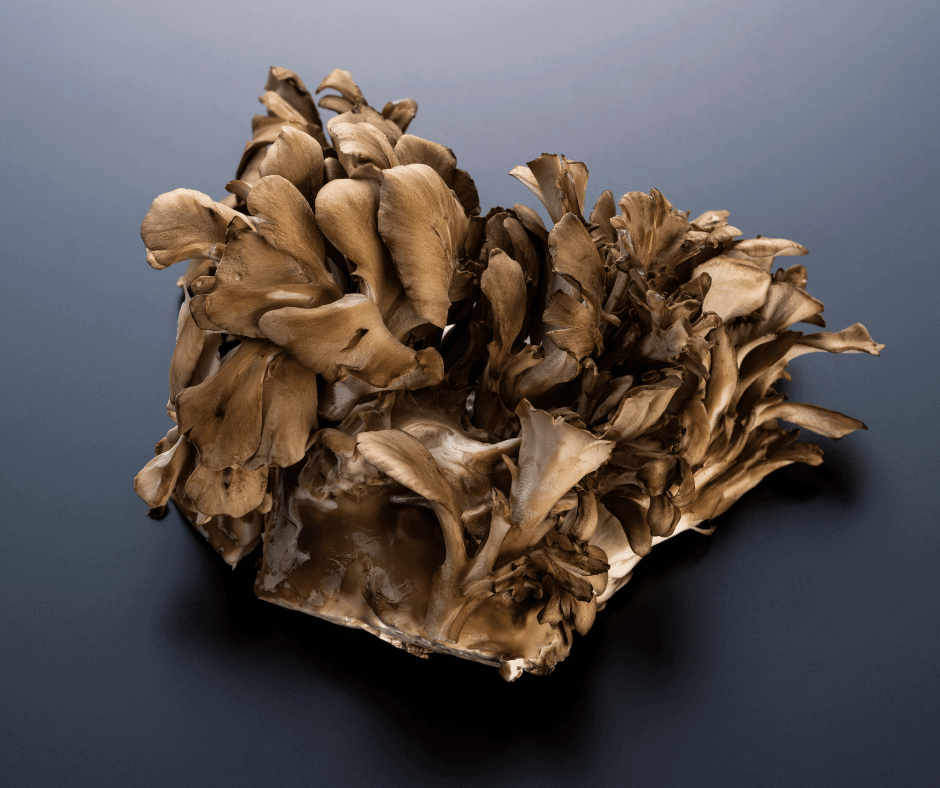
How much maitake should I take?
Maitake research on humans is still limited, so dosage recommendations should be considered with caution. Please consult a doctor before adding and/or increasing maitake supplementation in your regimen.
Dosage will vary person-to-person based on body composition, age, size, health status, gender, and more - that’s why it’s important to consult a physician before consuming new supplements like maitake. The recommended dosage noted by most sources says that taking anything from 6g to 20g of maitake per day may help with overall health. Your maitake dosage depends on your unique situation and desired effect.
It’s recommended to start at a lower dose and slowly increase your dosage over time as you adjust to the supplement.
What are the side effects of maitake?
The good news is that there are very few reported side effects of maitake mushroom supplementation. More research needs to be done in order to compile a comprehensive overview. Always talk to your doctor before adding supplements to your health routine.
The few reported side effects of maitake include:
Maitake may also increase bleeding. So it’s important to not take maitake within two weeks of a scheduled surgery, if you have a bleeding disorder, if you’ve recently given birth, or if you’re currently pregnant or planning to become pregnant.
If you’re considering adding maitake to your health regimen, please consult a physician beforehand to ensure it’s the best choice for your health and wellbeing.
Curious about these side effects and want to learn more about possible maitake interactions? Visit our blog post to learn (a lot) more on this subject.


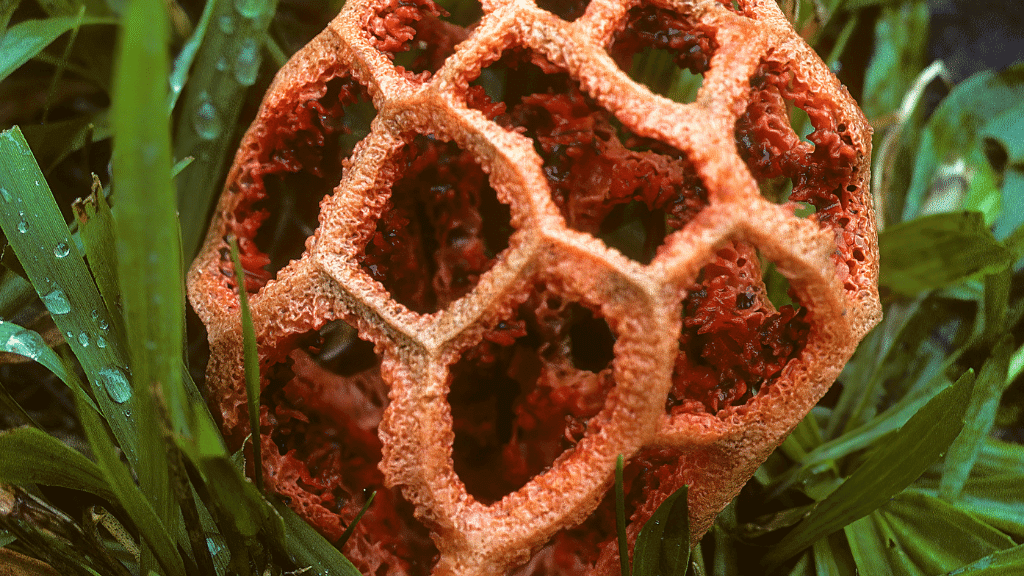
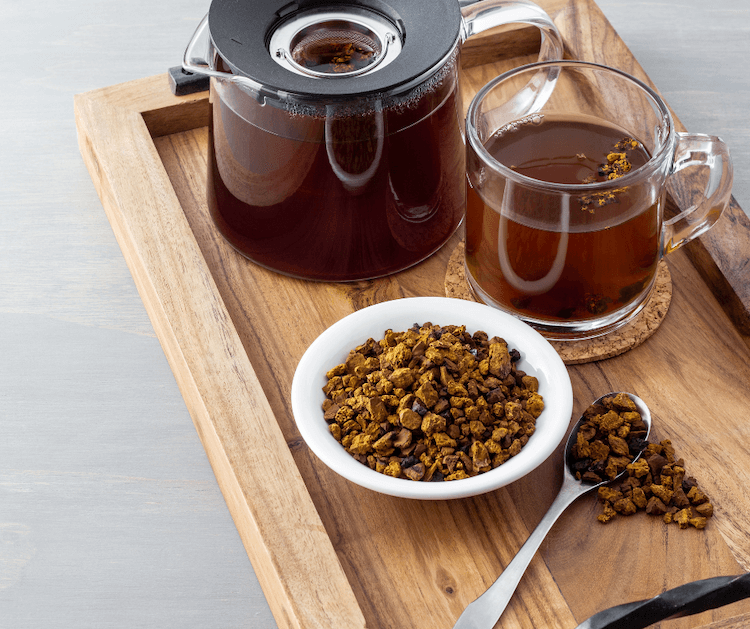


.png)
